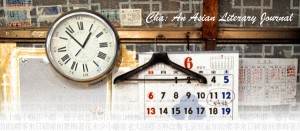 Cha: An Asian Literary Journal | Issue 12 | September 2010
Cha: An Asian Literary Journal | Issue 12 | September 2010
Let’s dive straight in, examining three of the issue’s first poems and their wrestle with words and meanings.
Phill Provance’s interlace poem “St. Petersburg Has Many Churches,” is perhaps the most abstruse, though its diction remains commonplace. The poem’s charm lies not in its form but in its unself-conscious vernacular. Its colloquial voice, inconsistent in a way typical to modern speech, uses contractions here but not there, and lumbers along monosyllabic platforms (many its, thats, and ises). The loftiest word is “ellipticizing,” but this neologism, rather than conjugating the Latinate directly (“ellipsing”), invokes the urban by conjugating gym ellipticals as root. All this results in the naturalization of the poem’s anfractuous form, such that it flows with incidental ease. This is hard to achieve. Provance himself comments that the poem is designed to be accessible despite its layered meanings, which makes it an appropriate gateway poem to the journal. Yet: why is a poem about St. Petersburg, or his second poem remembering lost love, placed as the opening of an “Asian Literary Journal”? The third stanza of “St. Petersburg” describes a vaguely Zen mode of seeing, but the other poem has nothing culturally comparable. We’ll return to this.
Fiona Sze-Lorrain’s “A Talk With Mao Tze-tung,” though also colloquial, achieves a much steadier voice. This poem addresses the quondam Chairman’s mortal absence, because “you are nowhere / until a Swedish journalist recites your poetry / and wonders . . .” Living, and dead, and revived, Mao’s core vitality resides in his words and ideas, which become corporeal by revolutions. Thoughts march, words poison, books are buried. And along the way, vituperation must question itself: “why am I talking to you, dead man?” It seems language persists even when we don’t desire it, and since “history has no last word,” this poem ends in questions, and the talk with Mao must pause until an answer comes alive again.
Kim-An Lieberman’s two poems are among my favorites for their adroitness. “After Ten Years,” a loose-octameter poem, turns list into narrative. The “Because” reiteration chants and expiates, swelling to crescendo; the final line hits the kind of poetic denouement that evokes quiet “hm”s from audiences at readings. In “Harvest,” we begin in miniatures (“single beads, stray buttons, broken twigs”) and end in nature’s enormity. The sound of children’s jubilance masks the tone and the suffocating fish onshore, until the ending when the ominous “sudden true hand” comes forth unveiled. Lieberman distinguishes herself in poetic brevity with truncated phrases like “This is not to sing / a strange-eyed child, some oracular pure . . .” and doesn’t sacrifice clarity for linguistic decoration, or vice versa.
Continue reading “Review: CHA: AN ASIAN LITERARY JOURNAL, ISSUE 12”